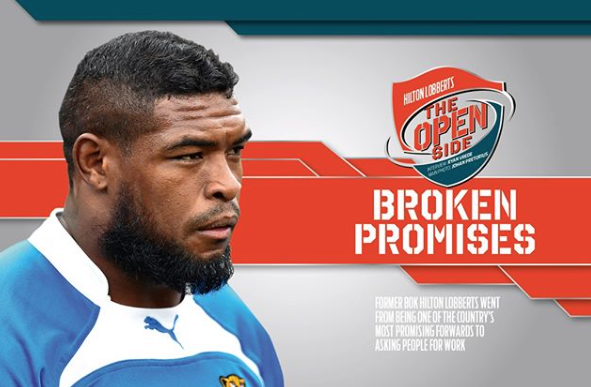Former Springbok lock Hilton Lobberts went from being one of the country’s most promising forwards to asking people for work. This is his story as told to RYAN VREDE for SA Rugby Magazine.
What was your childhood like in Chicago in Paarl East?
Chicago was a tough place. Rugby was my only way out. I was at school in New Orleans. My teacher, Henkie Green, introduced me to Ian Schwartz [then Bulls high performance manager and charged with recruitment of schoolboy talent]. Ian introduced me to Heyneke Meyer, who convinced me to come to the Bulls. I moved to Pretoria, and that literally saved my life.
What do you mean?
If I’d stayed at home I would have been a gangster, in jail or dead. I had a lot of friends in that life. I saw people shoot each other right in front of my eyes. I was asked to shoot people to prove my worth to a gang. We were poor, so to get things we wanted, nice clothes or whatever, you had to take it from other people. It was bad. Going to Pretoria saved my life.
Did you have professional prospects outside rugby?
No, I’m dyslexic and I wasn’t good at school. Rugby was the only way I was going to make a living. It was either that or gang life.
With hindsight, what were the best and worst qualities your upbringing gave you?
The best is that it made me tough, mentally tough. Where I come from, if you weren’t tough you didn’t stand a chance. There were times my mother put me out of the house because she thought I was a gangster. I had to find places to stay with other people. I was still very young and that was hard. But it taught me to be tough. The worst quality is an aggressive streak in me. Aggression was a good thing where I grew up. If you didn’t stand up for yourself you’d get hurt, maybe even die. I still have that fight to survive in me, but it shows in bad ways if I don’t control it. It was the thing that made me valuable as a player, but off the field, not so good.
When you were first drafted to the Bulls, what were your goals, dreams and ambitions? How close or far are you from them?
My father has nine kids, all are good rugby players. I was the only one to get an opportunity like this. Henkie Green told me that I have to be a rugby fanatic, I must live and breathe the game. I knew he was right because I didn’t have anything to fall back on. That’s why I was successful at the Bulls. But after that things didn’t go my way. It wasn’t what I expected it to be, especially money-wise. I didn’t have a degree and for some reason, players with a degree who weren’t better than me, got better contracts. There were a lot of coaches who took advantage of me because they saw me as stupid and desperate. I realised that too late in my career. People took advantage of me, but the worst was Jimmy Stonehouse at the Pumas. He isn’t a good person as a coach or in life. He opened my eyes and killed my love for the game. The way he treated me was terrible.
After your Test debut at Twickenham, did you feel like you belonged at that level?
I did. There were great players, like Bakkies Botha and Danie Rossouw. But I didn’t feel out of my depth. Jake White backed me, he made me believe in myself and I felt special.
Why do you think you played only one more Test after that?
Because there were great players ahead of me. Maybe the best we ever produced. The Bulls won Super Rugby in 2007 and then that Springbok team went on to win the World Cup. I accept that I wasn’t as good as the guys who were playing at the time. Someone like Brad Barritt, who played with me for the Junior Boks, had to go to England to make it. It was tough, but I have to accept it.
Talk to us about your relationship with money, especially in the early days of your career.
When I got my first contract, Heyneke Meyer told me that it isn’t good for a young guy like me have a lot of money. He told me to concentrate on playing well and looking after my body and the money will come. But I wanted to earn more, so when Rassie Erasmus [then director of rugby at Western Province] came in with a nice six-month contract [a couple of years after he signed with the Bulls], I grabbed it. I played well at the Stormers and he gave me a two-year contract with good money. But I never knew how to manage my money. Nobody taught me. My mother lived month to month. She never had extra to save. You only know what you know. Money confused me. When I had it, I didn’t strive to be the best any more. I got comfortable.
*Follow us on our new Instagram journey by clicking here
Do you remember how you spent the money you made from your first Bok tour?
I went home and bought my mother new furniture and appliances – everything. I did the same for myself at my house in Pretoria. I bought some other stupid stuff that I didn’t need.
Like what?
Nah, leave it. But the problem came after that when the tax man hit me with a R150 000 bill for what I earned on the end-of-year tour. Everything just fell apart after that. I bought that stuff for me and my mother, I got married and I bought a house. After paying that tax bill I was living month to month. People I trusted also ran away with my money.
People you were close to?
Yes, friends. One friend asked me to lend him R120 000. He never paid me back. There were other friends too. There were also businessmen who asked me to invest and then the businesses folded and I lost everything. I didn’t have the knowledge to make good decisions. I trusted them. I never expected them to hurt me.
Will your earnings from rugby sustain you in retirement, or must you look for a nine-to-five job?
I have almost nothing left from rugby. That’s the hard part, because I don’t have a degree or any skills other than rugby. If I were single it would be easier. But I have a family to support. It’s getting tougher and tougher. I’m playing club rugby at Hamiltons in Cape Town. I told them I don’t want to be paid to play, I want a job. I believe they’re going to help me. If I’d known then what I know now, my life would have been different.
Do players from backgrounds like yours need a specific type of coach to extract the best out of them? Or do you think it is the players’ responsibility to deliver, irrespective of the coach?
It’s a balance of the two. If you have a good coach who cares about you, you’ll give everything for them and the team. I’ve had some good coaches, but more bad ones than good.
Which coaches were the best and who have been the worst?
The best coaches I’ve had were Pote Human, Matthew Proudfoot, Rassie Erasmus, Jake White and Hawies Fourie. But the best of them was John Dobson. He has done so much for me as a player and a person. And he hasn’t stopped. He has been an angel in my darkest times. He still tries to help me. The worst have been Franco Smith, Jimmy Stonehouse and Allister Coetzee.
I think there isn’t a good enough mentoring structure for young players, especially black and coloured players, in SA. Do you feel the system failed you?
It did. I know, from speaking to Australian and New Zealand players, they look after the young guys from difficult backgrounds. They treat you like family. If they see you going off the path, they help you. Here, if you stray, you’re gone. There’s this attitude here from coaches and administrators that we have so much young talent, that if you stray you aren’t worth the effort to help.
What are your goals in the game and when do you say, ‘I’ve got to build a life outside rugby’?
I’m at that point. I left the Pumas because I got tired tired of the way Jimmy Stonehouse was treating me. He made me quit. I couldn’t be away from my family and be unhappy. So I came home to support my wife and kids in their dreams and ambitions. I was called up to the Stormers for a pre-season game, but I don’t care if I play for the Stormers or any professional team again. I’m trying to move on with my life.





